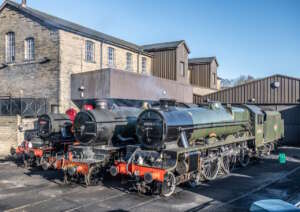Vivarail has announced that they will be working with Hoppecke to design and integrate batteries for Vivarail‘s Class 230 trains.
The deal cements the relationship between the two companies for a long-term future in developing battery trains for the UK rail industry.
Vivarail launched the UK’s first passenger battery train in the last 50 years in October 2018, carrying hundreds of passengers over three days in Scotland, an event supported by Transport Scotland and ScotRail.
The train was accompanied by its mobile charging unit which was used for a few hours each night to provide a day’s worth of charge.
A 3-car Class 230 can run for 65 miles between charges. This means they are more than able to operate numerous routes throughout the UK, and active conversations are taking place with interested operators.
Currently, the train manufacturer is building a fleet of diesel/battery hybrids to operate the Wrexham-Bidston line for Transport for Wales.
What did the officials say?
Adrian Shooter, CEO of Vivarail, said
“We are delighted to be working with Hoppecke – a company with similar values to our own. Hoppecke has built a strong reputation in their market for innovation, building customer relations and genuinely smart products. We have taken our time choosing a supplier with whom we want to work for many years as our order pipeline continues to grow. Together with Hoppecke we will be able to provide our customers with battery trains that are reliable, quick to market and with a rapidly increasing range. I look forward to the first of our Class 230 trains complete with Hoppecke batteries coming into service soon.”
Dr Marc Zoellner, CEO of Hoppecke, said:
“At Hoppecke we are excited to support Vivarail as the UK’s leading battery train manufacturer. We have followed their journey with great interest and were most impressed when they launched their battery train this year. We know that Vivarail intend to put battery technology at the heart of their design for the foreseeable future and we are delighted to be part of that.”
Where Next?
News Homepage
For the Latest Railway News
Christmas Present Ideas
Framed Prints, DVD’s / Blu-Ray’s and more in the RailAdvent Online Shop
LocoStop – The RailAdvent Community
Come and share your railway pictures
Vivarail
Visit their website






Responses
The battery electric Class 230 could be ideal to operate on smaller local branch lines in England. And diesel-electric Class 230 could operate on local branch lines such as operating on West Midlands Trains, Great Western Railway, Transport for Wales Rail and other operators including:
Great Western Railway
Thames Valley local lines:
Twyford-Henley-on-Thames
Maidenhead-Marlow via Bourne End
Slough-Windsor & Eton Central
West Ealing-Greenford
Cornish Local lines:
Par-Newquay
Liskeard-Looe
Truro-Falmouth
Plymouth-Gunnislake
Devon Local lines:
Exeter-Paignton
Exeter-Exmouth
Exeter-Barnstaple
Bristol & West local lines:
Bristol Temple Meads – Severn Beach
Swindon – Westbury
Swindon – Cheltenham
Bristol – Weston-super-Mare/Taunton